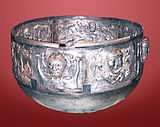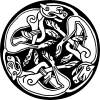- Abandinus, possibly a river-god
- Abellio (Abelio, Abelionni), god of apple trees
- Alaunus (Fin), god of healing and prophecy
- Alisanos (Alisaunus)
- Ambisagrus, a god of thunder and lightning
- Anextiomarus (Anextlomarus, Anextlomara), a protector god
- Ankou, a god of death
- Atepomarus, a horse god
- Arvernus, a tribal god
- Arausio, a god of water
- Barinthus (Manannán mac Lir), a god of the sea and water
- Belatucadros, a god of war
- Belenus, a god of healing.
- Borvo (Bormo, Bormanus), a god of mineral and hot springs
- Borrum, a god of the winds.
- Buxenus, a god of box trees
- Camulus (Camulus, Camalos), a god of war and sky
- Canetonnessis
- Cernunnos
- Cicolluis god of Celtic army
|
- Cimbrianus
- Cissonius (Cisonius, Cesonius), a god of trade
- Mars Cnabetius, a god of war[1]
- Cocidius, a god of war
- Condatis, a god of the confluences of rivers
- Contrebis (Contrebis, Contrebus), a god of a city
- Dii Casses god of refuse
- Dis Pater (Dispater), a god of the underworld
- Esus (Hesus)
- Fagus, a god of beech trees
- Genii Cucullati, Hooded Spirits
- Grannus, a god of healing and mineral springs
- Icaunus, a goddess of a river
- Intarabus
- Iovantucarus, a protector of youth
- Lenus, a healing god
- Leucetios (Leucetius), a god of thunder
- Lugus, creation and learning
- Luxovius (Luxovius), a god of a city's water
|
- Maponos (Maponus), a god of youth
- Mogons (Moguns)
- Moritasgus, a healing badger god
- Mullo
- Nemausus, a god worshipped at Nîmes
- Nerius
- Nodens (Nudens, Nodons), a god of healing, the sea, hunting and dogs
- Ogmios
- Robor, a god of oak trees
- Rudianos, a god of war
- Segomo, a god of war
- Smertrios (Smertios, Smertrius), a god of war
- Sucellos (Sucellus, Sucellos), a god of love and time
- Taranis, a god of thunder
- Toutatis (Caturix, Teutates), a tribal god
- Tridamos bovine triplication and abundance
- Veteris (Vitiris, Vheteris, Huetiris, Hueteris)
- Virotutis
- Visucius
- Vindonnus, a hunting and healing god
- Vinotonus
- Vosegus, a god of the Vosges Mountains
|


